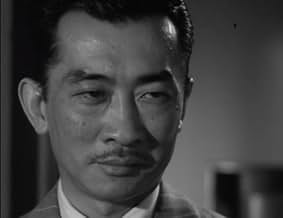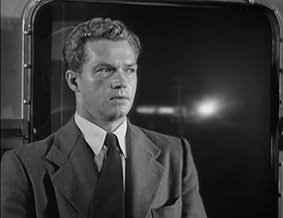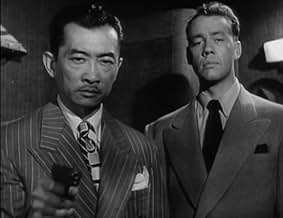Jim Fletcher, al risveglio da un coma, scopre che sarà processato alla corte marziale per tradimento e accusato di essere un informatore nemico in un campo di prigionia giapponese durante la... Leggi tuttoJim Fletcher, al risveglio da un coma, scopre che sarà processato alla corte marziale per tradimento e accusato di essere un informatore nemico in un campo di prigionia giapponese durante la seconda guerra mondiale.Jim Fletcher, al risveglio da un coma, scopre che sarà processato alla corte marziale per tradimento e accusato di essere un informatore nemico in un campo di prigionia giapponese durante la seconda guerra mondiale.
- Regia
- Sceneggiatura
- Star
- Helen Minoto
- (as Mary Marco)
- Hotel Manager
- (non citato nei titoli originali)
- Doctor
- (non citato nei titoli originali)
- Abbott
- (non citato nei titoli originali)
- Chief Jones
- (non citato nei titoli originali)
- Train Passenger
- (non citato nei titoli originali)
Recensioni in evidenza
The film with barely an hour and a quarter running time did not have much time for plot development. Basically Bill Williams is a sailor who developed hysterical amnesia while in a POW camp in the Pacific. He comes out of a two year coma and learns he's to be tried for treason. He's been accused of selling out his fellow prisoners while in Japanese custody. Worse than that, he's accused of murdering one of his best friends while a POW.
For a guy just coming out of a coma, Williams is a pretty agile person though he does retrogress at times. He heads for the widow of the man he's supposed to have murdered who is Barbara Hale. She's real reluctant to help him, but later when someone tries to kill them both she becomes a willing accomplice.
Given the limited amount of characters in the film, there wasn't a terrible lot of suspense for me. In fact I figured out who was behind it about a third into the film, it was that obvious to the audience, but not to Williams. To be fair there were reasons why he wouldn't consider the possibility of what actually was going on.
It was also just too too coincidental that he happened to run into the chief nemesis of the POWs, a sergeant who is played by Richard Loo whom they find in LA's Chinatown.
The film had a lot of potential, it was a good idea, but it needed a far better script and direction.
Unfortunately, a compromised script prevents the promising start from reaching front rank. Paradoxically, the screenplay is from ace writer Carl Foreman (High Noon; Bridge on the River Kwai, et al). I can only surmise that the brief running time (63-minutes) and a tight B-movie shooting schedule forced him to compromise the narrative in implausible fashion. For example—Hale's quick turnaround with escaped fugitive Williams, especially when she thinks he's responsible for her husband's death; the chance encounter with Japanese ex-prison guard Richard Loo; the cops unexplained boarding of the train in the middle of nowhere when they planned to wait in Glendale; but most of all, the angelic mother who allows a fugitive stranger she's just let in the door to hide in the same room as her infant son.
These devices may expedite the plot, but they also come across as just that, plot devices-- too many, in my view, for what is also a pretty dense narrative. At the same time, guessing the mystery's real culprit becomes pretty easy, thereby undermining the suspense. Also, director Fleischer shows little of the personal engagement that distinguishes his other noirs. All in all, the movie adds up to an average programmer that unfortunately promises more than it delivers.
'The Clay Pigeon' turned out to be well executed in most areas. It is not one of the best films in the genre or of the decade (neither though expected, that would have been asking for too much in my view), and it is not perfect or completely lives up to the premise. It though is well made considering the budget and that it was made quickly, it also hardly wastes the potential it has. So if asked as to whether 'The Clay Pigeon' is recommended, my answer would be yes.
Good things are many. It is slickly and stylishly shot, with the noir-ish shadowy lighting adding to the mystery, in no way does it come over as cheap. The film is also directed at a crisp pace, even if not always in complete consistent control of the material. The music is haunting and doesn't come over as over-bearing or over-emphasised in mood.
On the most part, the script is leanly taut and smart. The story is mostly lively and suspenseful, as well as atmospheric. It has a great start as well as a nail-bitingly tense climax, while there is a moving scene with the mother's account of her son. Bill Williams and Barbara Hale are engaging leads and the supporting cast are more than able.
Do agree however that 'The Clay Pigeon' has too much going on in the story, especially in the latter stages that come over as over-stuffed and rushed. The film could have done with a longer length, 10-15 minutes longer so that parts could have gone into more depth, like the cops boarding of the train.
While liking the script on the whole, it did lose focus later and stretches credibility where things happen too much by chance and where things turn around too abruptly with no real warning. More could have been done to make the lead character more rootable, Williams plays him very well but the character himself can be on the obnoxious side.
In conclusion, pretty good. 7/10.
She's understandably unhappy to see him and even more so when he binds and gags her, then heads north to Los Angeles in her car, with her in it. When pursuers almost run them off the road and down a ravine, she starts to believe his story about being innocent. In L.A., he enlists the aid of another survivor (Richard Quine), who advises him to lay low as the `Old Lady' (the Navy) is watching them both.
Then one evening in the White Lotus, a `chop-suey joint' oddly run by Japanese, he spots among them the most sadistic of the guards, nicknamed `the Weasel.' Soon he finds himself the fall guy, or clay pigeon, in a transpacific scheme to launder millions in counterfeit currency printed in anticipation of Japanese victory and occupation. Its operations come very close to him....
The Clay Pigeon is another of the trim and stripped-down noir thrillers churned out by Richard Fleischer in the post-war years. While not as deftly worked out as Armored Car Robbery or The Narrow Margin, it clocks in at just over an hour and delivers the goods. Its stars, Williams and Hale, were married at the time and would remain so until his death. Among their children is actor William Katt (Williams' birth name), the spit-and-image of his dad. Hale, of course, had a long run as Perry Mason's gal Friday, and Raymond Burr named an orchid he cultivated after her - not Della Street, but Barbara Hale.
Lo sapevi?
- QuizThis film is based on a true story of a U.S. serviceman recognizing his former sadistic Japanese POW camp guard on a street in Los Angeles. The guard, who had been born in the US, and therefore was an American citizen, had moved to Japan before the war and returned to the US afterwards. He was convicted of treason.
- BlooperWhen the train is shown leaving Los Angeles with "The Weasel" on board, it has a Pennsylvania Railroad logo on the nose of the locomotive. The Pennsylvania did not serve the west coast - this was obviously stock footage.
- Citazioni
Mrs. Helen Minoto: Have they gone?
Jim Fletcher: They've left the building, but they may be back.
Mrs. Helen Minoto: You'd better wait a few minutes.
Jim Fletcher: I owe you an apology... Why did you help me?
Mrs. Helen Minoto: You said you were in trouble. I knew they weren't the police.
Jim Fletcher: I'm sorry I had to upset Johnny.
Mrs. Helen Minoto: Oh? He'll go to sleep now. He's a good boy. He's just like his father.
Jim Fletcher: The 442nd was quite an outfit.
Mrs. Helen Minoto: Yes, it was.
- ConnessioniFeatured in Noir Alley: The Clay Pigeon (2018)
I più visti
- How long is The Clay Pigeon?Powered by Alexa
Dettagli
- Tempo di esecuzione1 ora 3 minuti
- Colore
- Proporzioni
- 1.37 : 1
Contribuisci a questa pagina




































